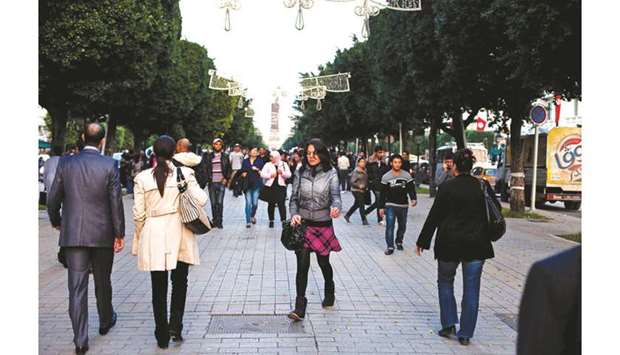Tunisia’s parliament backed an ambitious budget that aims to double economic growth next year and narrow the deficit as a new leadership bids to address the aspirations of a generation fed up with post-Arab Spring stagnation.
The 47.2bn dinar ($16.6bn) spending and revenue plan for 2020 is almost a sixth bigger than this year’s. It foresees economic growth of 2.7%, up from an anaemic 1.4% in 2019, while the budget deficit shrinks to 3% of gross domestic product from 3.5% in 2019 and 4.8% in 2018. The bill must still be approved by President Kais Saied.
The bill, whose approval was announced by the Wataniya 2 TV channel, puts Tunisia’s financing needs at 11.2bn dinars next year, with about 8.8bn dinars coming from external sources. The North African country sold €700mn at its last international bonds sale in July.
Under an amendment, local banks and insurance companies will be subject to a 3% levy on their profits that will go toward funding social-welfare programmes, Iyadh Loumi, the president of the parliament’s finance committee, said by phone. Turning the proposals into concrete progress will be a major test for Prime Minister-designate Habib Jemli. But first he must find the coalition partners he needs to build a ruling coalition. Jemli is backed by the moderate Ennahda Party that topped October’s election and must overcome reticence among smaller parties that remain suspicious of the group’s religious moorings.
Alone among the nations convulsed by the series of 2011 uprisings, Tunisia has cemented a vibrant democracy, transferring power in presidential and parliamentary elections this year. But Jemli and the newly installed president are political outsiders, propelled to power by widespread frustration with the country’s establishment.
The two men have inherited a stumbling economy weighed down by years of political infighting, protests by powerful labour unions and terrorist attacks in 2015 that damaged the critical tourism industry.
The International Monetary Fund approved a $2.9bn loan for Tunisia in 2016, and authorities have been struggling to implement some of the fund’s calls for spending cuts while grappling with social issues such as youth unemployment that’s double the national average.

Pedestrians walk along Avenue Bourguiba in Tunis (file). Tunisia’s parliament backed an ambitious budget that aims to double economic growth next year and narrow the deficit as a new leadership bids to address the aspirations of a generation fed up with post-Arab Spring stagnation.
